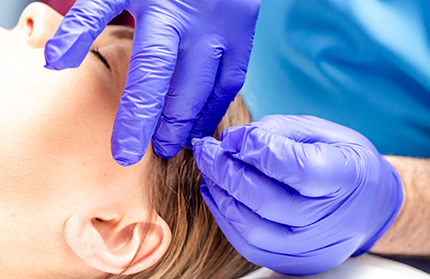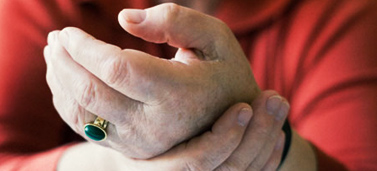One of the most common type of arthritis is osteoarthritis, as it affects millions of people globally. Osteoarthritis develops when the protective cartilage of the bones starts to wear as time passes by. It is also referred to as “degenerative arthritis” because the cartilages of the joint degenerate. Although this condition can affect all joints of the body, it mostly affects the lower back, the hips (mostly in senior citizens), the neck, the knees (sometimes due to a previous injury), and the hand (mostly the end finger joints). Although osteoarthritis can develop in young people, it most often develops in people who are 45 years of age and older. A person suffering from osteoarthritis will possibly experience one or more of the following symptoms:
- Reduced movement range
- Joint pain
- Stiffness
- Joint instability
- Muscle weakness
- Grinding or grating during movement.
Hand osteoarthritis is more likely to occur in the following spots:
- At the joint located at the base of the thumb: This is where the thumb and the wrist meet. There may be bony knobs or bumps close to the site of arthritis.
- At the joint located in the middle of the finger: There may be bumps called Bouchard’s nodes.
- At the joint located at the end of the finger: This is the joint closest to the nail. The Heberden’s nodes might grow there.
How Hand Osteoarthritis Is Diagnosed
A physical examination and medical history are usually used to diagnose osteoarthritis. Traceable symptoms of hand osteoarthritis also include loss of motion, warmth, swelling, and deformity. X-rays (to show changes in bone or bone spurs development) and bone scans (to show arthritis) may also be used to diagnose arthritis.
Treatment of Hand Osteoarthritis
Getting through daily life with hand osteoarthritis can be difficult with stiffness and pain in the wrists. Although there are challenges attached to hand osteoarthritis, there are several ways some simple lifestyle can be adjusted to living comfortably with the condition. Hand osteoarthritis can make turning keys, gripping objects or opening jars tough. It should be noted that although the underlying process of osteoarthritis cannot be reversed, its symptoms can be effectively managed. Here are three effective ways osteoarthritis can be managed:
Medications: The primary symptoms of osteoarthritis (pain) can be effectively managed by using certain medications. Some of these medications include duloxetine (Cymbalta), non-steroidal anti-inflammatory drugs (ibuprofen and naproxen sodium), and acetaminophen (Tylenol). Theses medication should be taken as prescribed by a physician so as not to cause damages.
Therapy: Occupational therapy and physical therapy are effective ways hand osteoarthritis can be managed. An occupational therapist can help an individual find out ways he or she can carry out daily activities without stressing the already painful joint. For example, brushing of teeth could be easier using a large grip toothbrush. A physical therapist can also create a personalized exercise program aimed at reducing pain and strengthening the muscles around a joint.
Use of cold or heat: While cold is generally used to reduce swelling and alleviate sharp pain, heat is used to ease stiffness and help tired muscles. Using a cold pack or an ice pack on the affected region for 10 to 20 minutes or taking an ice bath and putting the affected part into a bath of ice and water are ways cold can be used to reduce swelling and alleviate sharp pain. Moist heat pad, a paraffin bath, heat wraps, and a warm shower are ways heat can also be used to calm stiffness and pain as well as provide comfort and mobility. However, a therapist or physician is in the best position to advise on the best method for an individual.
Most importantly, being proactive and educated about your condition is important. For instance, knowing the causes of hand osteoarthritis, the available treatment options, etc. can help you manage the condition effectively. This can be achieved by participating in self-management programs and/or attending arthritis support programs.
RPI Therapy Services has helped many clients learn to manage their osteoarthritis symptoms. For more information on our occupation and/or physical therapy services, call us today at 314-252-0924.


